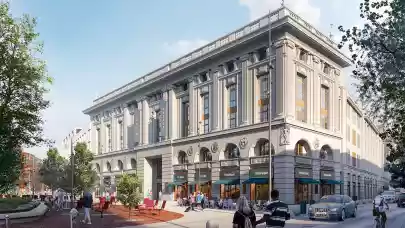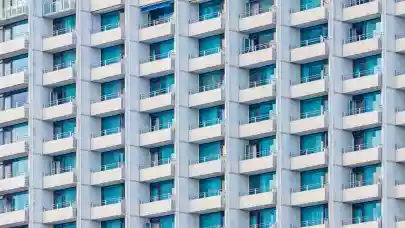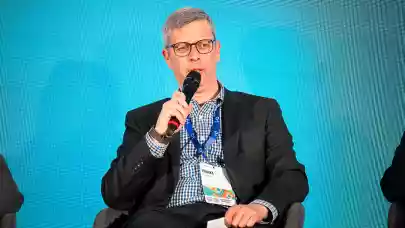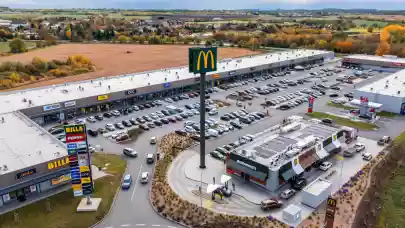
Remodelling an iconic commercial building and preserving its historic heritage is a challenge. Finding a perfect tenant mix for a long period is an even bigger problem. Property Forum asked Oliver Balogh and Viktor Balogh, founders of Corvin Palace Kft. about the ways the development company met these challenges.
The retail market has several problems as demand has decreased due to the general economic crisis across the CEE. Where is the right place in this market for your first mixed-use development in Hungary?
While retail demand has overall decreased due to many different issues (inflation, the general economic situation of Europe, online shopping, etc.) we still see strong demand for everyday consumption items, and service providers for local customers. Therefore, our retail tenant mix, which strongly emphasises stores providing such items, like Spar, DM and our pharmacy, and service providers such as Erste Bank, can thrive even in this challenging environment.

Olivér Balogh
Founder
Corvin Palace Kft.
Time Out Market will open its first Hungarian centre in Corvin Palace. Why did they choose this location?
We think they chose us because Corvin Palace is a one-of-one type of building. No other building in the city truly possesses the mixture of qualities that Corvin Palace has; its first-grade location with a huge number of public transportation options, its history, and its splendour, both internally and externally.
The following was their answer: Time Out Market is all about bringing the best of the city together under one roof: a curated mix of the best local and home-grown chefs, drinks and cultural experiences. Budapest is one of Europe's most beautiful and buzzy cities where locals and tourists love to go out. By opening here, the Time Out Market team acknowledges Budapest's vibrant and diverse culinary and cultural scenes combining both traditional, classic and modern, hip elements. Corvin Palace is a perfect place to celebrate the best of the city - it's been part of the city for almost one century and has heaps of history. Most importantly, the recent thoughtful and ambitious redevelopment delivered by an experienced team does this beautiful, iconic building justice, bringing it back to its original glory at the heart of the city. All these were reasons for choosing this location for a new Time Out Market.

Viktor Balogh
Founder
Corvin Palace Kft.
Everyone knows the phrase: Retail is detail. What was your challenge in defining the tenant mix in this centre?
Defining the retail mix was an even harder challenge than it otherwise would have been, as we started the process at the beginning of COVID-19. At the start of our planning phase for the building, the first question was whether we should have a regular shopping centre with an internal atrium, and stores around that atrium, to keep the department store style of the original building with one main tenant, or to do something different. Even before Covid hit, department stores were on a downturn.
After a long period of planning, we found no feasible way of remaking Corvin into a regular shopping mall; therefore, we decided to do something new. When Covid hit, several surveys showed that stores which have direct access to the streets were coping much better than the ones in a shopping mall. Therefore, we decided to lease our ground floor in a way that all tenants would have direct access from the street. This way, we were able to sign tenants for long-term contracts very early on in the process, which was an immense help in securing the financing of the building.
Office demand has changed rapidly over the past years. Why do you think a relatively large space (several floors) of the building will be rented out?
Now, we don’t believe that. We were very close to signing one of the largest office deals of 2022 late that year, but after that deal collapsed, observing the state of the Hungarian office market, we pivoted. First to a serviced office concept (which we think is the most profitable and active segment of the office market) and then, in late 2023, to a hotel function. Everything above Timeout Market, except for the rooftop, will be part of the hotel. We have already signed the HoT with our tenant; we hope that we can announce the final agreement sometime over this Summer.
Corvin Palace is an iconic building with several unique technical specifications. What was the biggest problem to solve during the construction phase?
There were several challenges, but mainly two stood out. The first was the jet-grouting process of the -1st floor, which allowed us both to enhance the internal height of the -1st floor and to waterproof the building from below. Jet grouting is a very rarely used technique, which strengthens the base under the pillars holding the weight of the building.
The second was that during the demolition phase, we found many undocumented heritage artefacts, like the original reliefs showcasing the Hansa origins of Corvin’s original owner (behind a brick wall), and stuccos on the first-floor ceiling, hidden above layers of fake ceiling. While we were very happy with these discoveries, and renovated all of them, they resulted in a constant process of modifying the existing plans for the construction.
How big is the carbon footprint of this property? What kind of investments were made to comply with all ESG standards?
During the entire process, we were conscious of our attempts to keep as much of the original building intact as possible. We truly believe that renovation projects, such as the Corvin Palace project, are the greenest projects possible since they allow for the least amount of new materials to be built in. While the heritage façade restricted us from making the building as energy-efficient as it would have otherwise been possible, we did everything else we could. We installed brand new, triple glass windows and doors. We threw out the building’s original gas-powered heating system, and installed heat pumps.
We applied thermal insulation to the internal courtyards (which are not heritage-protected) and are planning to install internal thermal insulation to the main façade, which is heritage-protected. We equipped the building with a modern BMS system which maximizes the operational efficiency of the building. We will be installing solar panels to every section of the roof where the heritage department allows us.
Property managers face several hurdles even after the grand opening. How would you adjust the services offered if visitors show other interests?
Our lease agreements are always long-term, and after signing the hotel agreement, we will be at 100% capacity. Therefore, we will not have a lot of options regarding our tenant mix for the foreseeable future, but we will be doing whatever we can to attract as many people to Corvin Palace as possible. Moreover, we think that the local retail heavyweights, such as Spar, DM, Libri, and Erste Bank, in combination with the global attraction of Time Out Market Budapest and the upcoming hotel, will prove to be a very strong tenant mix for our visitors.
What kind of digital innovations (AI or others) will be used in doing business there?
We designed the building with a BIM system, allowing us to deal with issues much more easily during the operations period of the building, which makes any future modifications to the building much easier.



